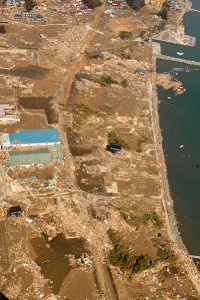When Disaster Strikes on Vacation
March 16, 2011 by ThriveOnTravel
Filed under Travel News & Tips

Aerial view of tsunami damage north of Sendai, Japan.
Recent earthquakes in Japan and New Zealand remind us that disasters can happen anywhere at anytime. What can you do if you’re traveling and you find yourself in an emergency situation?
Disasters often happen suddenly and with little to no warning so pre-planning is essential. While it’s impossible to plan for every eventuality, making a few key preparations will be useful in most situations.
Stay in touch with family or friends. Leave your itinerary with them. Take their phone numbers with you and make sure you know how to call them. This is especially important if you’re dialing internationally. If you’re planning to connect over the Internet, test your connections and account information before you leave and once you reach your destination. Call your Internet Service Provider before you depart and confirm you have the appropriate level of service. The same is true if you’re planning to take a cell phone with you. Call your cell phone service provider and verify you have the apprpriate cell phone and service plan. To the best of your ability, keep people informed of where you are and where you’re headed. You can also register your travel itinerary using the Smart Traveler Enrollment Program (STEP) through the U.S. Department of State website at https://travelregistration.state.gov.
Have a back up plan for obtaining copies of important documents such as your passport, visas, insurance documents, and credit card information. Leave paper copies and if possible, electronic copies with family or friends.
Make a note of important numbers and addresses at your destination such as the nearest U.S. consulate and police station. Carry appropriate identification and emergency contact information on you.
Consider travel insurance. If you have health insurance, check with your health care provider and confirm that your insurance will cover you while you’re traveling. If not, consider purchasing travel insurance. Verify that the travel insurance will cover emergency medical services and any trip interruptions due to natural or other disasters. Even if you do have medical insurance, you still may want to consider purchasing travel insurance. Depending on the type of travel insurance, it may reimburse the cost of the trip and provide emergency spending money. Be sure and read the fine print so you know what you’re getting.
If you find yourself in an emergency situation, try your best not to panic. You’ll be able to think and respond more quickly if you remain calm. Follow the warnings and directions of local authorities.
Disasters can strike without warning. It may be more difficult to access information after they hit so making plans in advance is one of the best defenses you have. A plan doesn’t guarantee safety but it may put you in a better position to connect to loved ones and get needed assistance.
ThriveOnTravel.com
Sima Kimble